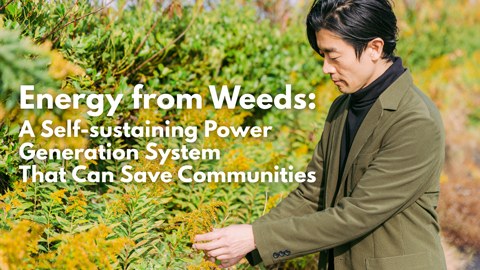In 2020, a waste-recycling facility complex with hotel was opened in Kamikatsu Town, Tokushima Prefecture, a community that has been working for years on progressive solutions to reduce waste. What is the significance of this? And what future is this town aiming for?

The Zero Waste Center is shaped like a question mark. Its architectural design encourages visitors to think about the relationship between production and consumption.

Looking down from above, an intriguing pair of buildings appears in the shape of a question mark. The complex, opened last year in the town of Kamikatsu in Tokushima Prefecture, is the one-of-a-kind Zero Waste Center, comprising a garbage collection facility, a learning center and public hall, a collaborative laboratory, and a hotel.
Kamikatsu, in the mountains of the Shikoku region, is home to nearby 1,500 people. Back in 2003, the small community was the first municipality in Japan to set itself a target of zero waste, subsequently drawing attention both domestically and internationally. Since their declaration to eliminate landfill and incinerated waste by 2020, the residents have worked together to fulfill the principles of the “3Rs” of reduce, reuse, and recycle. As the town does not operate its trash collection service, the residents take their garbage themselves to the town’s single waste-collection center, where they then separate it into more than 45 different categories. Meanwhile, they compost kitchen waste and food scraps at home. With the town having devised such a waste system, the residents have gained a keen awareness of the need to reduce waste completely. Through their collective efforts, the residents of Kamikatsu now recycle more than 80% of their overall waste.


Kamikatsu residents separate their own trash into over 45 different categories. In doing so, they can envision just what can be reused and how, thus becoming aware of the bigger picture after things have been thrown away.
However, some categories of the waste, such as diapers and disposable heat packs, are exceedingly difficult and expensive to recycle. Disposing of the final 20% is a big problem indeed—something that the Zero Waste Center was conceived precisely to address. By broadly promoting the town’s zero-waste initiative and effecting changes in people’s mindsets, its aim is to enlighten society about the need for zero waste. Not only does the Zero Waste Center offer people from Kamikatsu and elsewhere a venue to come together, but it also confronts them with the problem of waste by giving visitors and hotel guests the first-hand experience of sorting trash.
In charge of the Center is OTSUKA Momona, who describes the significance of the facility and its unusual shape, saying “Why do we buy things? Why do we throw them away? Why do we make things? Why do we sell them? This place gives us the opportunity to think about the many different ‘why’ questions stemming from waste.” On their arrival at the hotel within the complex, guests are first briefed about the Center. Overwhelmed by the detail of trash separation and aware that anything they might buy would contribute to the problem, some guests even reported choosing to refrain from making any purchases during their stay.
Besides welcoming hotel guests and other visitors, the Center is expected to become a leading place for research on zero waste. Working in tandem with businesses and universities to conduct research and development on 100% recyclable products, it will take important steps toward solving the problem of how to deal with the last 20% of the waste.

The hotel is named “WHY.” Especially impressive is how the windows have been built with 700 discarded fittings—collected from residents’ old sliding doors, etc.—that have been pieced together like a puzzle.

The shop inside the Center lets people exchange unwanted items for free. Residents bring in their reusable tableware, clothes, accessories, and other items, which anyone can take then home.
The Japanese government has pledged to reduce carbon emissions to net-zero by 2050. By displaying such firm intent to tackle environmental issues, it has made people nationwide more aware of the need to achieve a sustainable society. Of course, a big part of achieving that goal is overcoming the problem of waste. As Otsuka explains, “It is not just the 3Rs that are paramount to achieving zero waste: we must also consider the fourth R, which stands for ‘responsibility.’ Businesses need to produce and manufacture with the idea of disposal in mind, and consumers need to choose products that can be recycled and reused as resources in the end. That is the key to society’s future.” In its new zero-waste declaration announced in 2020, Kamikatsu Town has also placed considerable importance on environmental education for the next generation. Taking on those challenges, the small town continues to lead the way toward Japan’s future circular economy.

OTSUKA Momona decided to move to Kamikatsu Town, having been attracted by the town’s initiatives. “It would be great if this town of ours could lay the foundations to create a world of zero waste and achieve a circular economy.”





























